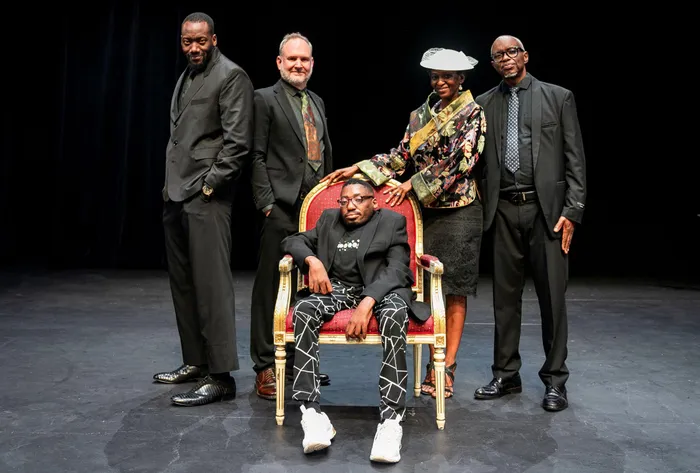Calvin Ratladi's 'Breakfast with Mugabe' delivers a bold, haunting portrait at The Market Theatre

The cast brings to life the final years of Robert Mugabe’s rule in Zimbabwe in Fraser Grace’s award-winning play 'Breakfast with Mugabe', delving into the troubled mind of the once-revered leader as he confronts inner demons and political paranoia.
Image: Ngoma Ka Mphahele
After a powerful debut at the 2025 National Arts Festival, Calvin Ratladi’s Breakfast with Mugabe is set to make its way to the Market Theatre - bringing with it a bold, unflinching meditation on power, memory, and the ghosts that haunt leadership.
The production, which drew strong responses during its Makhanda run from July 3 to 6 as part of the festival - South Africa’s longest-running and most prestigious celebration of the arts - marked a significant moment for Ratladi, this year’s Standard Bank Young Artist for Theatre.
Based on the award-winning script by British playwright Fraser Grace, the production reimagines President Robert Mugabe not as the distant figure we’ve come to know through headlines and political discourse, but as a haunted man, navigating memory, grief, and the ghosts of power.
In Grace’s fictionalised account, loosely inspired by reports that Mugabe once sought psychiatric help for his declining mental health, we find Zimbabwe’s former president in conversation with a white psychiatrist.
What begins as a clinical session soon unravels into a layered exploration of trauma, nationalism, identity, and the burdens of leadership. Breakfast with Mugabe has been hailed as a “modern-day Macbeth,” but in Ratladi’s hands, the play becomes something even more personal and political.
“Never in my deepest existence did I imagine I would direct this play,” Ratladi admits.
“I read it in 2016 while I was still an undergrad. I loved the script, but it was not the kind of work I gravitate towards.”
Yet something lingered. Over the years, he noticed how the themes of land dispossession, power, African culture, spirituality and ancestry echoed his own artistic concerns. The connection deepened, not just with Mugabe the leader, but with Mugabe the man.
“I was interested in who this man really was. Not the version fed to us by the media and propaganda. I wanted to know the colour of his underwear, the small decisions in his household that somehow held global consequences. These things aren’t just personal, they’re ancestral, psychological, spiritual.”
To ground the production in authenticity, Ratladi brought on a cultural dramaturg from Zimbabwe, Professor Samuel Ravengai, an academic intimately familiar with the country’s spiritual and political terrain.
The dramaturg helped guide certain choices in the staging, allowing Ratladi to merge intuitive direction with lived cultural insight. “Every moment in the show was decided,” he says. “Sometimes I followed their advice fully, sometimes partially. But I always listened.”
His cast, too, reflects this commitment to truth. Themba Ndaba brings gravitas to the role of Robert Mugabe, while Gontse Ntshegang embodies Grace Mugabe with a commanding, complex presence. Craig Jackson rounds out the principal cast as Andrew Peric, the probing psychiatrist whose sessions with Mugabe drive the psychological tension of the piece.
One surprise addition was the actor cast as the president’s bodyguard, Farai Chigudu, who flew in from Zimbabwe to audition.
“I asked him three times to come in, and he never once mentioned he was flying from Zimbabwe,” Ratladi recalls. “Now he’s here, in South Africa, making his theatre debut.”
The production process was as intense as the script itself. With just four weeks to mount the piece, Ratladi and his team worked at an unrelenting pace, driven by what he describes as a divine plan.
“This felt like God’s work. Everything aligned, cast, collaborators, and timing. Things I dreamed about years ago just started falling into place.”
But why should people come see Breakfast with Mugabe? For Ratladi, the answer lies in what the play dares to confront.
“In African leadership, vulnerability is still a taboo,” he says. “And I think this play opens up that conversation. It shows how the political and the personal are deeply intertwined, how a moment of discomfort in a leader’s household can spill over and shape the fate of an entire nation.”
Ratladi refers to the piece as being “full of flaws, fear, brilliance, and brokenness.” At its heart, it’s about human beings, not headlines. “I had to guide the actors to play real people. That meant stripping away performance masks and finding emotional truth. I hope audiences leave unsettled, in the best way, questioning the cost of silence, the weight of history, and what it means to protect the myths of one’s life.”
Ratladi insists that Breakfast with Mugabe is far more than a biographical study; it's a meditation on the aftershocks of colonialism, the psychological toll of liberation, and the fragile humanity obscured by political power. His interpretation is steeped in African cosmology and cultural specificity, yet it echoes with a universality that resonates far beyond the continent.
“Every day I walked into rehearsal, it felt like coming home,” he says. “Not work. Home. And we understood the politics of this continent, but also where we are now, and how this story might speak to the global moment.”
He adds that the production has changed him. “One thing this work has taught me is to trust slowness. To listen. I’ve learned that the most powerful moments are found in the quiet corners of a scene, in the breath before the line. It’s reaffirmed my commitment to telling African stories with complexity, without simplifying our realities to fit Western expectations.”
Breakfast with Mugabe will make its highly anticipated debut at The Market Theatre, where it will run from July 16 to August 10.
Related Topics: